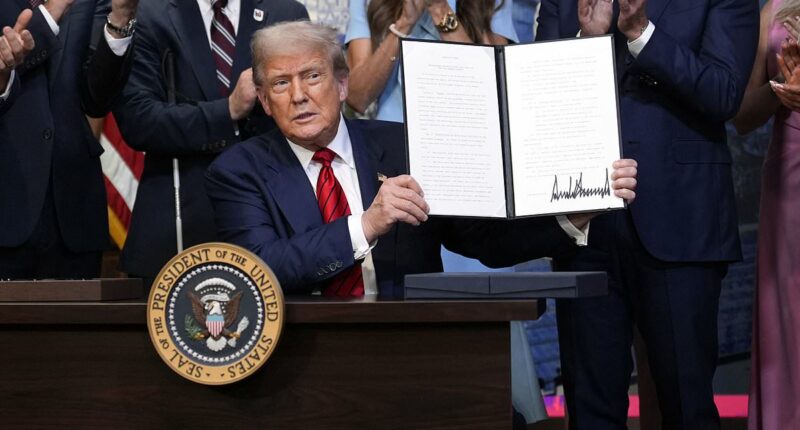Share this @internewscast.com
The Trump administration is pushing for immigration services to start evaluating the social media profiles of those seeking visas or green cards to identify ‘anti-Americanism.’
President Donald Trump’s immigration agenda has focused on strengthening U.S. Citizenship and Immigration Services, and now this scrutiny will extend to those aiming to obtain citizenship.
The US Citizenship and Immigration Services announced that officers will assess if applicants for benefits, such as residency, work, and visa permissions, have ‘endorsed, promoted, supported, or otherwise espoused’ views that are anti-American, terrorist, or antisemitic.
Matthew Tragesser, USCIS spokesman, stated, ‘America’s benefits should not be awarded to individuals who harbor disdain for the country and promote anti-American ideologies.’
‘Immigration benefits-living and working in the United States-remain a privilege, not a right. It’s straightforward: if you dislike America, don’t attempt to live here.’
It isn’t specified what constitutes anti-Americanism and it isn’t clear how and when the directive would be applied.
Elizabeth Jacobs from the Center for Immigration Studies, which advocates for immigration limitations, remarked on Tuesday, ‘The message is clear: the U.S. and its immigration services will exhibit less tolerance for anti-Americanism or antisemitism when evaluating immigration cases.’
Jacobs said the government is being more explicit in the kind of behaviors and practices officers should consider, but emphasized that discretion is still in place.

The Trump administration’s immigration services is going to begin scanning potential green card applicants’ social media accounts for ‘anti-Americanism’

President Donald Trump has made toughening up U.S. Citizenship and Immigration Services a key part of his agenda on immigration
‘The agency cannot tell officers that they have to deny – just to consider it as a negative discretion,’ she said.
Critics worry the policy update will allow for more subjective views of what is considered anti-American and allow an officer’s personal bias to cloud his or her judgment.
‘For me, the really big story is they are opening the door for stereotypes and prejudice and implicit bias to take the wheel in these decisions. That´s really worrisome,’ said Jane Lilly Lopez, associate professor of sociology at Brigham Young University.
The policy changes follow others recently implemented since the start of the Trump administration including social media vetting and the most recent addition of assessing applicants seeking naturalization for `good moral character’.
That will not only consider ‘not simply the absence of misconduct’ but also factor the applicant´s positive attributes and contributions.
‘It means you are going to just do a whole lot more work to provide evidence that you meet our standards,’ Lopez said.
Experts disagree on the constitutionality of the policy involving people who are not U.S. citizens and their freedom of speech.
Jacobs, of the Center for Immigration Studies, said First Amendment rights do not extend to people outside the U.S. or who are not U.S. citizens.

USCIS said officers will now consider whether an applicant for benefits, such as a green card, ‘endorsed, promoted, supported, or otherwise espoused’ anti-American, terrorist or antisemitic views
Ruby Robinson, senior managing attorney with the Michigan Immigrant Rights Center, believes the Bill of Rights and the U.S. Constitution protects all people in the United States, regardless of their immigration status, against government encroachment.
‘A lot of this administration´s activities infringe on constitutional rights and do need to be resolved, ultimately, in courts,’ Robinson added.
Attorneys are advising clients to adjust their expectations.
‘People need to understand that we have a different system today and a lot more things that apply to U.S. citizens are not going to apply to somebody who´s trying to enter the United States,’ said Jaime Diez, an immigration attorney based in Brownsville, Texas.
Jonathan Grode, managing partner of Green and Spiegel immigration law firm, said the policy update was not unexpected considering how the Trump administration approaches immigration.
‘This is what was elected. They´re allowed to interpret the rules the way they want,’ Grode said. ‘The policy always to them is to shrink the strike zone. The law is still the same.’
USCIS has made several moves as Trump has returned to office to ally with the president’s agenda.
They have implemented new restrictions in compliance with Trump’s executive orders to suspend processing of requests for legal permanent residency for immigrants granted refugee or asylum status, CBS News reports.

US Citizen and Immigration Services has implemented new restrictions in compliance with Trump’s executive orders to suspend processing of requests for legal permanent residency for immigrants granted refugee or asylum status

The increased restrictions on immigration applications come as countries have begun issuing travel warnings for the US after Customs and Border Patrol have detained a number of tourists
The Department of Homeland Security said the green card processing pause was necessary to comply with two executive actions issued by the president.
‘USCIS is placing a temporary pause on finalizing certain Adjustment of Status applications pending the completion of additional screening and vetting to identify potential fraud, public safety, or national security concerns, in alignment with Mr. Trump’s executive actions,’ the statement said.
According to a presidential proclamation cited by officials, Donald Trump has instructed federal agencies to ‘vet and screen to the maximum degree possible all aliens who intend to be admitted, enter, or are already inside the United States.’
The administration’s tightening of restrictions on immigration policies and procedures are the latest attempts to tackle concerns of national security and fraud.
The move comes after Trump questioned the immigration vetting procedures under the Biden administration.
USCIS also announced earlier this month that they have updated immigration policy to restrict visa eligibility for transgender women seeking to compete in women’s sports.
Under the policy update, USCIS will consider ‘the fact that a male athlete has been competing against women’ as a negative factor when evaluating visa petitions in categories such as O-1A for extraordinary ability, EB-1 and EB-2 green cards for highly skilled workers, and national interest waivers.
‘USCIS is closing the loophole for foreign male athletes whose only chance at winning elite sports is to change their gender identity and leverage their biological advantages against women,’ said USCIS spokesperson Matthew Tragesser.
‘It’s a matter of safety, fairness, respect, and truth that only female athletes receive a visa to come to the U.S. to participate in women’s sports.’
The move comes amid the president’s broader efforts to bar transgender athletes from competing in women’s sports with the United States set to host the Olympics in Los Angeles in 2028.
















